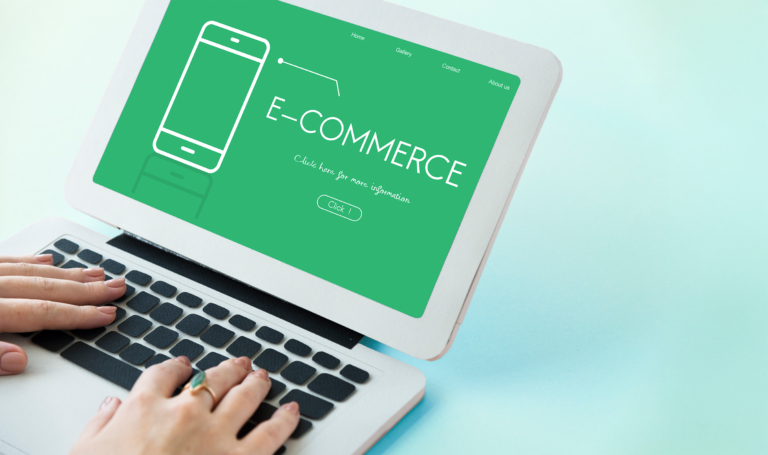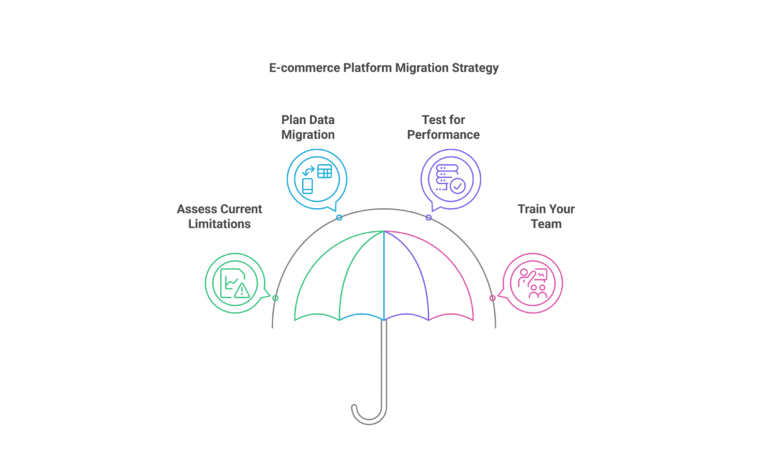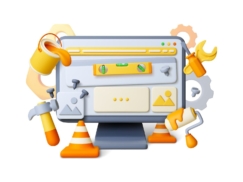Greetings! I'm Aneesh Sreedharan, CEO of 2Hats Logic Solutions. At 2Hats Logic Solutions, we are dedicated to providing technical expertise and resolving your concerns in the world of technology. Our blog page serves as a resource where we share insights and experiences, offering valuable perspectives on your queries.

Quick Summary
Enterprise e-commerce solutions are designed for large-scale businesses handling high traffic, complex transactions, and multi-channel sales. This guide explores different platform types, including SaaS, open-source, and headless e-commerce, along with their benefits like scalability, security, and omnichannel capabilities.
Additionally, it provides insights on choosing the right platform, budgeting for long-term sustainability, and ensuring a seamless migration process for business growth.
Have you ever had your online store crash during a massive sale? Or watched helplessly as international customers abandoned their carts because your platform couldn’t handle multiple currencies? If you’re nodding along, you’re probably experiencing the growing pains of outgrowing your current e-commerce solution.
The good news? You’ve got options. Today’s enterprise e-commerce solutions are more powerful and flexible than ever.
In this guide, we’ll cut through the tech jargon and help you understand what matters when choosing an enterprise e-commerce platform. We’ll examine different options, compare the big players, and give you practical insights to help you make the right choice for your business.
What is an Enterprise E-commerce Solution?

An enterprise e-commerce solution is a high-performance platform for large-scale businesses handling significant traffic, complex transactions, and multi-channel sales.
Unlike standard e-commerce platforms, these solutions offer advanced customization, scalability, and smooth integrations to support high-volume operations. They are built to handle the unique needs of enterprises, ensuring reliability, efficiency, and security in their operations.
Types of Enterprise E-commerce Solutions Available
Businesses can choose from different enterprise e-commerce solutions based on their needs.
- SaaS (Software as a Service): Hosted platforms like Shopify Plus and BigCommerce Enterprise offer scalability and ease of use, making them ideal for businesses that prefer managed solutions with minimal technical overhead.
- Open-source platforms: Solutions like Shopware and Magento (Adobe Commerce) allow complete customization and flexibility. They give businesses full control over their e-commerce architecture while requiring dedicated development expertise.
- Headless e-commerce: API-driven solutions separate the frontend from the backend, enhancing customization and ensuring a seamless, personalized shopping experience across multiple touchpoints.
This approach aligns with modern microservices architectures and the MACH (Microservices, API-first, Cloud-native, Headless) principle, enabling greater agility and scalability.
What Are the Benefits of Enterprise E-commerce Platforms?
Enterprise e-commerce platforms come with several advantages that make them the preferred choice for large-scale businesses.
- Scalability: These platforms can handle high traffic and transaction volumes effortlessly, ensuring a seamless shopping experience even during peak times.
- Security: Robust data protection and compliance features, including GDPR adherence, PCI DSS compliance, and CSP (Content Security Policy), protect sensitive business and customer information, reducing the risk of data breaches.
- Omnichannel Capabilities: Integration with multiple sales channels, including online marketplaces and brick-and-mortar stores, helps businesses expand their reach and boost sales.
- API-Driven Architecture: These platforms enable easy third-party integrations with CRM, ERP, and payment solutions, allowing businesses to streamline their operations efficiently.
- Personalization: AI-driven recommendations enhance the shopping experience by offering tailored product suggestions based on customer behavior and preferences.
The Best Enterprise E-commerce Platforms

Several platforms cater to enterprise businesses, each with unique strengths and capabilities.
- Shopware: This platform is highly flexible, API-first, and customizable, making it ideal for businesses seeking adaptability in their e-commerce strategy.
- Advantage: Highly flexible and API-first, making it ideal for customization and scalability.
- Disadvantage: Requires strong development expertise for advanced customizations.
- Magento (Adobe Commerce): Ideal for businesses needing deep customization and extensive third-party integrations, making it a favorite for enterprises with complex e-commerce needs.
- Advantage: Extensive customization and third-party integration capabilities.
- Disadvantage: High development and maintenance costs.
- Shopify Plus: A user-friendly, SaaS-based platform that provides scalability and ease of management, making it a great choice for businesses looking for a hassle-free solution.
- Advantage: User-friendly and easy to manage, requiring minimal technical effort.
- Disadvantage: Limited flexibility for deep customization compared to open-source solutions.
- BigCommerce Enterprise: This platform is well-suited for both B2B and B2C enterprises, offering strong customization and integration options.
- Advantage: Strong native B2B and B2C features without heavy customization needs.
- Disadvantage: Can be costly as transaction fees apply for certain payment providers.
- Salesforce Commerce Cloud: A cloud-based solution equipped with AI-powered features that enhance automation, personalization, and analytics. It offers distinct B2B and B2C solutions, formerly CloudCraze and Demandware.
- Advantage: AI-powered automation and personalization enhance customer experiences.
- Disadvantage: High licensing and implementation costs make it expensive for many businesses.
How to Choose the Right E-commerce Platform for Your Enterprise?
Selecting the right enterprise e-commerce platform requires careful consideration of several factors.
- Business Model Compatibility: Ensure the platform supports your structure, whether B2B, B2C, or a hybrid model. For feature-rich B2B operations, platforms like Magento (Adobe Commerce) or Shopware are ideal.
- Scalability Needs: The platform should handle peak traffic and large transaction volumes without performance issues. Shopify Plus or BigCommerce Enterprise can scale effortlessly if you anticipate high growth.
- Security & Compliance: Choose a platform with robust security measures, GDPR compliance, and best practices like regular penetration testing. For highly regulated industries, Salesforce Commerce Cloud offers enterprise-grade security.
- Customization & Flexibility: A platform that allows easy modifications and third-party integrations ensures businesses can tailor it to their needs. Magento and Shopware provides extensive customization options for unique business models.
- Total Cost of Ownership (TCO): Balance upfront costs with long-term ROI to ensure financial sustainability. If budget efficiency is a priority, SaaS solutions like Shopify Plus offer predictable pricing with lower maintenance costs.
Budgeting for Your Enterprise E-commerce Software
A well-structured budget is essential for implementing an enterprise e-commerce solution.
- Platform Costs: Businesses should account for licensing fees for SaaS platforms or development expenses for open-source solutions.
- Cloud Infrastructure & Hosting: Whether opting for cloud-based hosting or an on-premise setup, infrastructure costs, including CDN (Content Delivery Network) and data residency requirements, should be factored into the budget.
- Maintenance & Upgrades: Ongoing development, support, and regular updates are necessary to ensure optimal platform performance.
- Third-Party Integrations: Costs for integrating essential tools like CRM, ERP, payment gateways, and marketing automation should be considered to enhance functionality.
How to Successfully Migrate to an Enterprise E-commerce Platform?
Migrating to a new platform can be a complex process, but with proper planning, businesses can ensure a smooth transition.

- Assess current platform limitations. Before making the switch, businesses should identify pain points and evaluate what the new platform must improve upon.
- Plan data migration to ensure all essential information, including product catalogs, customer data, and order history, is transferred securely and without errors.
- Test for performance, security, and functionality before going live to ensure a seamless user experience and minimize disruptions.
- Train your team for efficient operations on the new platform by providing comprehensive training and resources.
For Expert Migration Services
Conclusion
Choosing the right e-commerce platform is like finding a perfect business partner, it needs to match both your ambitions and daily operations. While Shopware, Magento, and Shopify Plus each offer unique strengths, at 2Hats Logic, we believe the best choice harmonizes two crucial aspects: your technical requirements and your team’s practical needs.
FAQ
How long does an enterprise e-commerce migration take?
Depending on the complexity, it can take anywhere from 3 to 12 months with careful planning and execution to ensure minimal disruption.
Which platform is best for B2B enterprises?
Platforms like Shopware, Magento (Adobe Commerce), BigCommerce, and Salesforce Commerce Cloud B2B are well-suited for B2B transactions, offering robust features tailored for business clients.
What security measures should enterprises consider?
Enterprises must implement SSL encryption, PCI compliance, fraud detection, secure payment gateways, penetration testing, and CSP policies to ensure data protection and prevent cyber threats.
Table of contents
- What is an Enterprise E-commerce Solution?
- Types of Enterprise E-commerce Solutions Available
- What Are the Benefits of Enterprise E-commerce Platforms?
- The Best Enterprise E-commerce Platforms
- How to Choose the Right E-commerce Platform for Your Enterprise?
- Budgeting for Your Enterprise E-commerce Software
- How to Successfully Migrate to an Enterprise E-commerce Platform?

Related Articles







